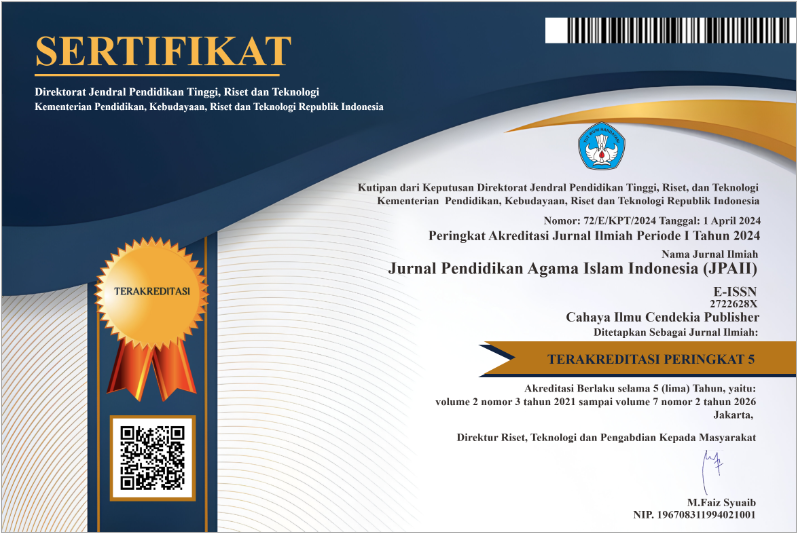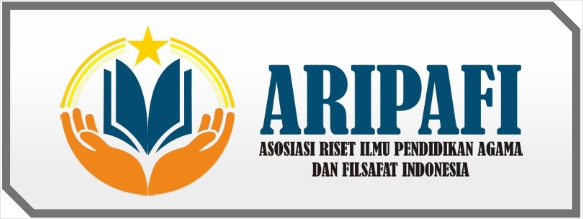The Role of Islamic Religious Education Teachers in Forming Students' Disciplined and Responsible Characters
Abstract
Purpose of the study: The purpose of this study is to determine the role of Islamic Religious Education teachers in efforts to form a disciplined character, the role of Islamic Religious Education teachers in efforts to form a responsible character, and the supporting and inhibiting factors in efforts to form a disciplined and responsible character in the school.
Methodology: This research is a qualitative descriptive study. The subjects of the study were the principal, vice principal, teachers, and students. Data collection was done by interview.
Main Findings: The results of the study showed that Islamic Religious Education teachers in efforts to form disciplined and responsible characters showed their roles, namely: the role as educators, acting as models and role models, and the role as motivators. In efforts to form these characters, there are supporting and inhibiting factors in their implementation. Supporting factors come from teachers, parents, and the environment. Then the inhibiting factors come from peers.
Novelty/Originality of this study: The results of this study provide a new perspective on the effectiveness of the role of Islamic Religious Education teachers as agents of character formation for students through a value-based education approach that is integrated into teaching and learning activities.
References
Saryanto, R. Retnaningsih, Nofirman, M. Muhamadiyah, and I. Yuniwati, “Analysis The Role of School Culture in Shaping The Personality and Character of Students,” MUDIR, J. Manaj. Pendidik., vol. 5, no. 2, pp. 477–482, 2023, doi: 10.55352/mudir
N. Hasibuan, A. D. Hasibuan, and M. Mahidin, “Good Character: the role of counseling teacher in establishing student discipline character in madrasah,” KONSELI J. Bimbing. dan Konseling, vol. 10, no. 1, pp. 125–132, 2023, doi: 10.24042/kons.v10i1.16467.
M. Mahmudulhassan, M. Abuzar, S. M. Riazul, O. Rahman, and A. E-sor, “Strategies for Forming Student Discipline in Islamic Elementary Schools Malaysia : A Holistic Approach in Character Education,” Solo Univers. J. Islam. Educ. Multicult., vol. 2, no. 3, pp. 207–218, 2024.
L. Lukman et al., “Effective Teachers’ Personality in Strengthening Character Education.,” Int. J. Eval. Res. Educ., vol. 10, no. 2, pp. 512–521, 2021.
N. Nurlailah and H. Ardiansyah, “The Influence of the School Environment on Character Form Students in PKN Lessons,” Riwayat Educ. J. Hist. Humanit., vol. 5, no. 2, pp. 281–289, 2022.
S. Mustoip, D. Lestari, and R. Purwati, “Implementation of STEAM Learning Methods to Develop Collaborative and Creative Characters of Elementary School Students,” J. Prim. Sch. ISSN, vol. 1, no. 2, pp. 14–20, 2024.
M. S. A. Huda, S. Sariman, and M. Khasanudin, “Strategy of Islamic Religious Education Teachers in Improving The Islamic Character Of Students,” Scaffolding J. Pendidik. Islam dan Multikulturalisme, vol. 4, no. 2, pp. 58–70, 2022.
T. Trisnawaty, H. Herawati, and T. Hidayat, “The Role of Teachers in Realizing the Goals of Islamic Education,” J. Kaji. Perad. Islam, vol. 5, no. 2, pp. 157–163, 2022, doi: 10.47076/jkpis.v5i2.117.
M. Bilal, “Islamic Religious Education Teacher ’ s Strategy in Instilling the Value of Religious Nationalism with Islamic Tsaqofah Subjects,” PARADIGMA, vol. 22, no. 01, pp. 44–55, 2025.
S. Syarnubi, F. Mansir, M. E. Purnomo, K. Harto, and A. Hawi, “Implementing Character Education in Madrasah,” J. Pendidik. Islam, vol. 7, no. 1, pp. 77–94, 2021.
Aningsih, M. S. Zulela, A. Neolaka, V. Iasha, and B. Setiawan, “How is the Education Character Implemented? The Case Study in Indonesian Elementary School,” J. Educ. Soc. Res., vol. 12, no. 1, pp. 371–380, 2022, doi: 10.36941/jesr-2022-0029.
M. J. Susilo, M. H. Dewantoro, and Y. Yuningsih, “Character education trend in Indonesia,” J. Educ. Learn., vol. 16, no. 2, pp. 180–188, 2022, doi: 10.11591/edulearn.v16i2.20411.
M. N. Ihsan, N. Ahmad, A. Hasanah, and A. Suhartini, “Islamic Boarding School Culture Climate in Forming The Religious Attitude of Islamic Students in Modern and Agrobusiness Islamic Boarding Schools,” Nazhruna J. Pendidik. Islam, vol. 4, no. 2, pp. 362–382, 2021, doi: 10.31538/nzh.v4i2.1492.
D. Kurniawan, J. Jaenullah, S. R. Jannah, D. Setiawan, and M. Mispani, “Strategy for Increasing the Learning Qur’an Hadits Quality for the Students’ Religious Character,” J. As-Salam, vol. 7, no. 1, pp. 57–71, 2023, doi: 10.37249/assalam.v7i1.583.
N. Sangsuk and T. Thipchart, “Discipline Strategies: Parent’S Experiences for Early Childhood Development in North Eastern, Thailand,” J. Keperawatan Soedirman, vol. 18, no. 1, pp. 8–17, 2023, doi: 10.20884/1.jks.2023.18.1.6618.
R. Yusuf and I. Fajri, “Differences in behavior, engagement and environmental knowledge on waste management for science and social students through the campus program,” Heliyon, vol. 8, no. 2, p. e08912, 2022, doi: 10.1016/j.heliyon.2022.e08912.
I. Iksal, R. A. Hayani, and A. Aslan, “Strengthening character education as a response to the challenges of the times,” Indones. J. Educ., vol. 4, no. 3, pp. 761–774, 2024.
S. Solheri, M. Azhar, and Y. Yohandri, “Analysis of ethnoscience integrated environmental literacy for junior high school,” JPBI (Jurnal Pendidik. Biol. Indones., vol. 8, no. 2, pp. 178–188, 2022, doi: 10.22219/jpbi.v8i2.17657.
L. Mukarromah and S. Hujjah, “NU Teacher Learning Innovation : Integrating Technology in Islamic Value-Based Education,” J. Pergunu Contemp. Islam. Stud., vol. 1, no. 1, pp. 103–122, 2024.
Z. Elen, W. Kithinji, and F. Mutwiri, “Influence of Teacher Value on The Provision of Value-Based Education In Muslim Private Secondary Schools In Mombasa County, Kenya,” Rev. J. Educ. Pract., vol. 5, no. 1, pp. 73–82, 2024.
A. H. Surbakti, “Values-Based Leadership Approach In Managing Cultural Diversity In Islamic Educational Institutions,” TIME J. J. Islam. Taransformation Educ. Manag., vol. 1, no. 1, pp. 1–9, 2024.
L. Lasiman, M. Roqib, N. Nurfuadi, and A. Kirin, “Character Education Through the Example of the Prophet Muhammad SAW in The Book Nur al-Yakin Fi Sirah Sayyid al-Mursalin,” Adv. Humanit. Contemp. Stud., vol. 5, no. 1, pp. 10–22, 2024.
A. G. Rezka, S. Subandi, and A. Amiruddin, “The Concept of Children’s Faith Education (Comparative Study Abdullah Nashih Ulwan and Zakiah Daradjat Thoughts),” Bull. Sci. Educ., vol. 1, no. 1, pp. 60–67, 2021.
S. Sirait, “Islamic Theology with A Multicultural Perspective as the Basis for Religious Learning in Yogyakarta State Elementary Schools,” Eur. J. Educ. Pedagog., vol. 2, no. 5, pp. 64–71, 2021, doi: 10.24018/ejedu.2021.2.5.170.
B. Ulum and I. Syafi’i, “Implementing Contextual Teaching and Learning Models in Islamic Religious Education Learning,” Acad. J. Teach. Learn., vol. 1, no. 1, pp. 45–53, 2022, doi: 10.59373/academicus.v1i1.6.
H. Hosaini, A. Zukin, and M. Firdaus, “Development Of Islamic Religious Education Books With Contextual Teaching And Learning,” J. At-Tarbiyat J. Pendidik. Islam, vol. 5, no. 1, pp. 113–125, 2019, doi: 10.37758/jat.v5i1.404.
B. Muslim, A. Mardhiah, and M. Djuned, “Internalization of Religious Moderation Values in the Qur ’ an Hadith Textbooks at Madrasah Aliyah,” Southeast Asian J. Islam. Educ., vol. 06, no. 02, pp. 235–248, 2024.
M. Nursikin and M. Aji Nugroho, “Internalization of Qur’Anic Values in the Islamic Multicultural Education System,” Didakt. Relig., vol. 9, no. 1, pp. 19–38, 2021, doi: 10.30762/didaktika.v9i1.3241.
F. Widat and A. S. Wulandari, “Affirming Moral Excellence: Strengthening Character Education Through Habituation and Innovative Learning Management,” Manag. Indones. J. Educ. Manag., vol. 5, no. 2, pp. 112–124, 2023, doi: 10.52627/managere.v5i2.283.
A. Faiz, I. Kurniawaty, and P. Purwati, “Strengthening Character Education Through Habituation Activities,” Ta dib J. Pendidik. Islam, vol. 11, no. 2, pp. 309–318, 2022, doi: 10.29313/tjpi.v11i2.10289.
H. Khotimah, U. Manshur, A. W. Zaini, M. A. F. Sanjani, and S. Suhermanto, “Increasing the Competence of Islamic Religious Education Teachers From a Madrasah-Based Management Perspective,” Manag. Indones. J. Educ. Manag., vol. 6, no. 1, pp. 13–26, 2024.
M. H. Tuna, “The professionalisation of Islamic religious education teachers,” Br. J. Relig. Educ., vol. 44, no. 2, pp. 188–199, 2022, doi: 10.1080/01416200.2021.1999905.
A. T. Marsakha, H. Hariri, and Sowiyah, “Management of Character Education in School: A Literature Review,” Kelola J. Manaj. Pendidik., vol. 8, no. 2, pp. 185–194, 2021.
A. L. Astuti, H. Hamengkubuwono, and M. I. L. Pratama, “The Values of Honesty and Discipline in Character Education for Early Childhood,” Int. J. Innov. Educ. Res., vol. 2, no. 2, pp. 96–112, 2023, doi: 10.33369/ijier.v2i2.29153.
H. Harianto and I. Kandedes, “The Role of Islamic Religious Education Teachers in Forming the Disciplinary Character of Junior High School Students,” Ensiklopedia J. Pendidik. dan Inov. Pembelajaran Saburai, vol. 03, no. 01, pp. 18–26, 2023, doi: 10.2991/978-2-38476-110-4_100.
W. M. Lim, “What Is Qualitative Research? An Overview and Guidelines,” Australas. Mark. J., 2024, doi: 10.1177/14413582241264619.
F. Z. Muplihin, H. Mujib, I. T. Aristhantia, and R. Nurliani, “Analysis of Mustahik’s Welfare through The Distribution of Zakat Funds in" The Ciamis Care Program" at Baznas, Ciamis District,” Syari’ah Econ., vol. 7, no. 1, pp. 34–44, 2024, https://www.riset-iaid.net/index.php/SE/article/view/1970
I. Siregar, “Analysis of Betawi Language Interference on the Morphology of Adolescent Speech in Jakarta,” J. Humanit. Soc. Sci. Stud., vol. 3, no. 8, pp. 54–60, 2021, doi: 10.32996/jhsss.2021.3.8.7.
A. Gaurifa, “Ability Write Reading Summary,” IJEMSIndonesian J. Educ. Math. Sci., vol. 3, no. 1, p. 18, 2022, doi: 10.30596/ijems.v3i1.5499.
I. Mohedas, S. R. Daly, R. P. Loweth, L. Huynh, G. L. Cravens, and K. H. Sienko, “The use of recommended interviewing practices by novice engineering designers to elicit information during requirements development,” Des. Sci., vol. 8, 2022, doi: 10.1017/dsj.2022.4.
I. G. A. A. O. Dewi, “Understanding Data Collection Methods in Qualitative Research: The Perspective Of Interpretive Accounting Research,” J. Tour. Econ. Policy, vol. 1, no. 1, pp. 23–34, 2022, doi: 10.38142/jtep.v1i1.105.
A. M. Riazi, R. Rezvani, and H. Ghanbar, “Trustworthiness in L2 writing research: A review and analysis of qualitative articles in the Journal of Second Language Writing,” Res. Methods Appl. Linguist., vol. 2, no. 3, pp. 1–14, 2023, doi: 10.1016/j.rmal.2023.100065.
S. Donkoh and J. Mensah, “Application of triangulation in qualitative research,” J. Appl. Biotechnol. Bioeng., vol. 10, no. 1, pp. 6–9, 2023, doi: 10.15406/jabb.2023.10.00319.
J. Artanti, P. M. Agustini, A. Saptono, G. Kartika Hanum, and R. D.O., “Analysis Of Virtual Product Marketing Strategies To Increase Customer Satisfaction (Case Study On Bukalapak Partners),” IAIC Trans. Sustain. Digit. Innov., vol. 3, no. 2, pp. 86–109, 2022, doi: 10.34306/itsdi.v3i2.516.
A. J. Bingham, “From Data Management to Actionable Findings: A Five-Phase Process of Qualitative Data Analysis,” Int. J. Qual. Methods, vol. 22, pp. 1–11, 2023, doi: 10.1177/16094069231183620.
A. Tohri, A. Rasyad, M. Sururuddin, and L. M. Istiqlal, “The Urgency of Sasak Local Wisdom-Based Character Education for Elementary School in East Lombok, Indonesia.,” Int. J. Eval. Res. Educ., vol. 11, no. 1, pp. 333–344, 2022.
R. Y. Pratomo and I. Shofwan, “Implementation of Education and Training Program Evaluation,” Edukasi, vol. 16, no. 2, pp. 63–77, 2022, doi: 10.15294/edukasi.v16i2.39863.
F. Ariani, N. Ulfatin, A. Supriyanto, and I. Arifin, “Implementing Online Integrated Character Education and Parental Engagement in Local Cultural Values Cultivation,” Eur. J. Educ. Res., vol. 11, no. 2, pp. 1699–1714, 2022.
S. A. S. Paul, P. Hart, L. Augustin, P. J. Clarke, and M. Pike, “Parents’ perspectives on home-based character education activities,” J. Fam. Stud., vol. 28, no. 3, pp. 1158–1180, 2022, doi: 10.1080/13229400.2020.1806097.
B. Firmansyah and D. Darmawan, “the Importance of Islamic Education Teacher Competence and Parental Attention in Enhancing Students’ Character Formation At Nur Al-Jadid Excellent Islamic High School,” J. Cahaya Mandalika, vol. 4, no. 2, pp. 1353–1363, 2023.
S. Hou, “School Principal Academic Supervision in Improving Teacher Performance at Cokroaminoto Kauditan Elementary School,” J. Soc. Res., vol. 3, no. 1, pp. 126–144, 2023, doi: 10.55324/josr.v3i1.1663.
Copyright (c) 2025 Novia Hapsariningrum, Ibrahim Haruna Hassan al-Wasewi, Zeinab Esmaeili

This work is licensed under a Creative Commons Attribution 4.0 International License.
Authors who publish with this journal agree to the following terms:
- Authors retain copyright and acknowledge that the Jurnal Pendidikan Agama Islam Indonesia (JPAII) is the first publisher licensed under a Creative Commons Attribution 4.0 International License.
- Authors are able to enter into separate, additional contractual arrangements for the non-exclusive distribution of the journal's published version of the work (e.g., post it to an institutional repository or publish it in a book), with an acknowledgment of its initial publication in this journal.
- Authors are permitted and encouraged to post their work online (e.g., in institutional repositories or on their website) prior to and during the submission process, as it can lead to productive exchanges and earlier and greater citation of published work.







.png)
.png)





















